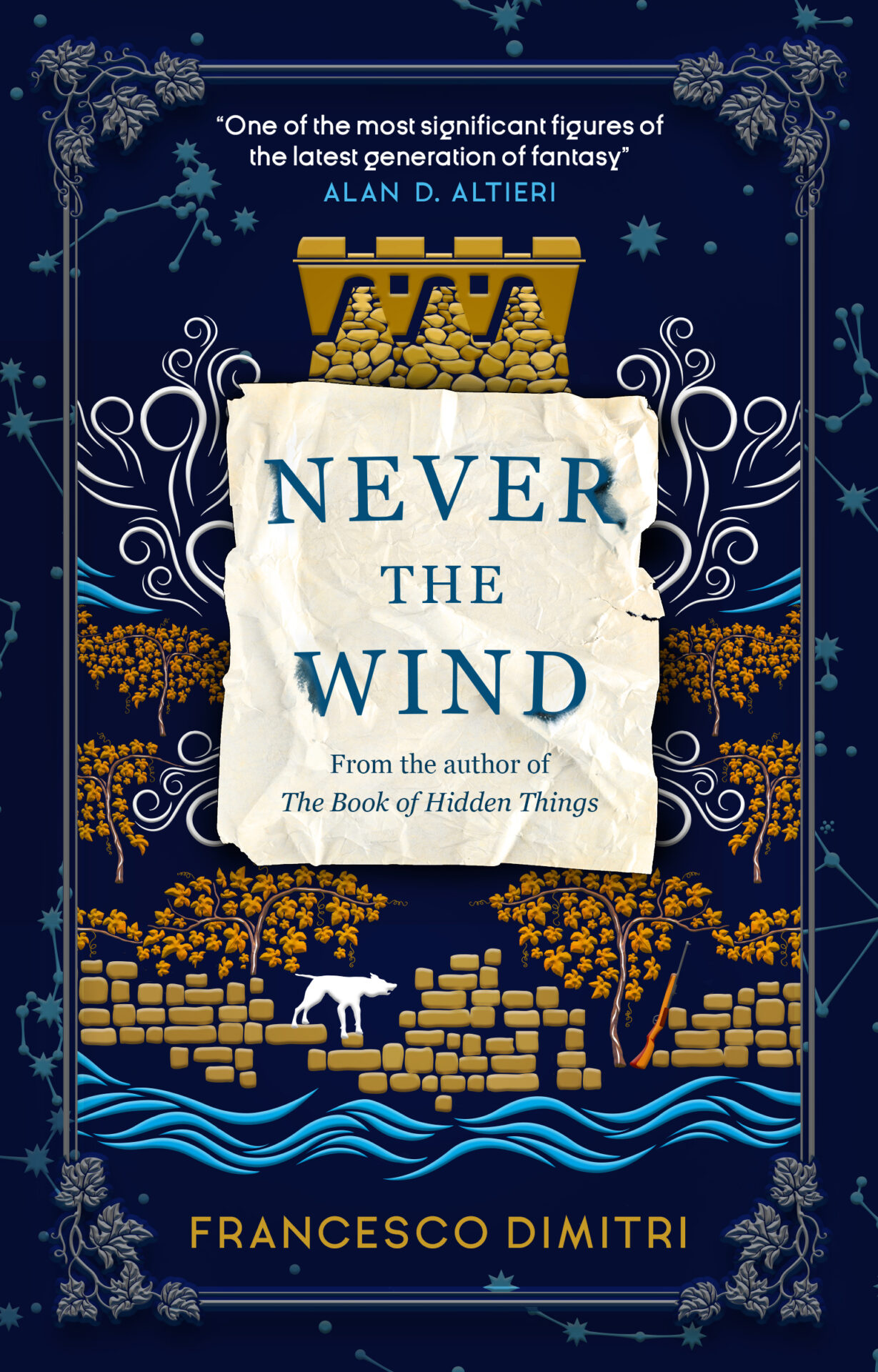
Francesco Dimitri is joining us today to talk about his novel, Never the Wind. Here’s the publisher’s description:
1996 – Luca Saracino is thirteen and has been completely blind for eight months when his parents move to a Southern Italian farmhouse they dream of turning into a hotel. With his brother dropping out of university and the family reeling from Luca’s diagnosis, they are chasing dreams of rebirth and reinvention.
As Luca tells his story without sight – experiencing the world solely through hearing, smell, taste and touch – he meets the dauntless Ada Guadalupi, who takes him out to explore the rocky fields and empty beaches. But Luca and Ada find they can’t escape the grudges that have lasted between their families for generations, or the gossiping of the town. And Luca is preyed upon by the feral Wanderer, who walks the vineyards of his home.
As Luca’s family starts to crack at the seams, Luca and Ada have to navigate new lands and old rivalries to uncover the truths spoken as whispers on the wind.
What’s Francesco’s favorite bit?

Francesco Dimitri
I believe in magic. I am not sure what this means: I am not saying I know for a fact that we are immortal souls, or that there is an ultimate truth to the universe and I got it. What I did get was my COVID shot as soon as I could. I am grateful that humans came up with the scientific method, that I can tap these words in London for a US blog which will be read worldwide (kind of). But I do believe in magic. My belief is not backwards, I hope; it is timeless.
I do not like much the word supernatural. Nature is deeper than we can imagine or understand (both our imagination and our intelligence are part of nature, so they must be smaller than the whole of nature): when I mention magic, I mean something that cannot be described in a straight-forward way, like love cannot be described. We had moments in our life when a kiss was more than a kiss, and we had moments when a shadow was more than a shadow, but we cannot just describe those moments, can we? We need stories, music, art, ritual, to talk about them – and if we are lucky to make sense of them, a little.
I believe our world is much more peculiar than we realise while we are taken by the overwhelming power of the daily grind – bills, jobs, broken cars, those myriad little things which may be meaningless in the grand scheme of the universe but still rule our life, by necessity. I believe that reality is only mundane when we are too busy to look well enough. Get close and you’ll see the cracks, the impurities, the strange lights. Everything stable and clear-cut is only such for a while.
For all my life I have been drawn to the edges where things cease to be stable and clear-cut. It may be because I grew up on a quietly wild strip of land by the sea, a land where land ends; it may be because I saw once too many times my grandmother talk to the Saints she believed in. It may be because my family went through some pretty dark times, when all they had built broke down fast as if struck by lightning, like in that tarot major arcana, The Tower. It may be simply because I am a weirdo myself. Be as it may, I love looking at the seams where a threadbare reality falls apart and magic shows through.
Never The Wind, I think, is a lot about this: lives come apart, families come apart, senses come apart, relationships come apart, and magic shines in the gaps. I wanted to capture a feeling of uncertainty, which means danger, yes, but also potential: when things stop being stable is when we have a chance to give them a different shape, a better shape, perhaps. We all need a small apocalypse every now and again.
I wanted magic to be central to this story, the way I believe it is central to life, which means, in practice, that I wanted people to be central. Is a monster haunting an empty forest monstrous? I wouldn’t think so: without us calling it a monster, it is just another creature. A story about magic is necessarily a story about people. In order to get to the fraying seams of the mundane, I had to tune in to the mundane first, and be very honest in telling what I noticed – warts and all. Not one character in this book is a cog in the plot, not in my intentions: all have their histories, their dreams, their fears. They are there because their voice brought something to the table.
Magic and people are two of my favourite bits of life. It would feel too much to say they are my favourite bits of this book, because as themes they are too large, too important: it is not for me to say whether I succeeded in giving you, the reader, the ride I had in mind. But I did love trying. I loved thinking, researching, I loved looking for magic words. I did love the work.
I suppose what I am aiming at is, this is my favourite bit of Never The Wind, the work I put into it. Nothing else is in my hands.
LINKS:
Never the Wind Universal Book Link
BIO:
Francesco Dimitri is an Italian author and speaker living in London. He is on the Faculty of the School of Life. He is considered one of the foremost fantasy writers in Italy, and his works have been widely appreciated by non-genre readers too. A film has been made from his first novel, La Ragazza dei miei Sogni (The Girl of My Dreams). The Book of Hidden Things was his debut novel in English.
